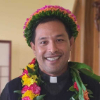So many things troubled my mind when the first semester came to an end. 2021 left me with so many unwanted thoughts and feelings. I couldn’t finish a final paper for one of my classes, one of my professors sent me a disappointed email about a late submission, and a close relative of mine passed away early in the morning on New Year’s Day. How could I possibly go on a retreat with this troubled mind?
And yet, somehow something deep inside of me was longing for a change, a real New Year that perhaps might shift everything for a better, new beginning.
My community, the Arrupe International Residence (AIR) in Quezon City, Manila, made a three-day retreat followed by a few days of relaxation in Baguio City in the Northern Luzon of the Philippines. After the early morning departure, the five hour bus-trip, and the afternoon free time, the retreat began after dinner with a session on the Jesuit vow of poverty–a talk with selected scriptural passages, guided points, reflection questions, and a grace to pray for while making the retreat. These points were presented to us (the Jesuits in training) by three Jesuits priests: Fr. Vidal (Vids) Gornez, SJ, Fr. Greg Soetomo, SJ, and Fr. Teodulo (Ted) P. Gonzales, SJ, who also lived with us in the community as our priestly formators.
Fr. Vids, the prefect of ministry and apostolate for the AIR community, summed up the vow of poverty for us that evening as: “Incarnated Poverty” because Jesus had become human in the Incarnation. The phrase “incarnated poverty” captured my imagination. I was already transfixed even before I went into the silent night of the retreat.
Early the next day, I awoke shivering from the coldest night I had experienced since my arrival in the Philippines. I tried to gather my thoughts for my first prayer of the day, but I needed to keep myself warm, so I went down for breakfast.
After breakfast, I was not warm enough, and was still sleepy from the night shivering so I fell back into a morning nap. “Incarnated poverty” awoke me into prayer. The thought of what this phrase might mean for me warmed my heart with much joy and desire for praying. A couple minutes in the morning led to several hours that afternoon, fully mesmerized by the graces of the “Incarnated Poverty.”
In my prayer, I imagined how, through Jesus, “Incarnated Poverty” came to be in his birth, while at the same time why it’s so captivating to me. In my imaginative eye, I could see clearly how the Incarnation unfolded. As the three Persons of the Trinity: the Father (God), the Son (Jesus), and the Holy Spirit (Their Love), had deliberately decided and agreed that Jesus must come into the world in the human form and live willfully a life of poverty.
As my prayer continued, I could see now that even Jesus’ choice of poverty was linked to his mission—the mission that he must bring salvation to a world that is full of imbalanced wealth. I experienced, at this moment of prayer, a clear and peaceful vision in my mind. All I could see is the depth of Jesus’s deliberate choice of poverty to do his Father’s mission for humanity.
As my prayer came to a conclusion, I had a clear vision that this poverty is freely given to humanity in the Eucharist, a self-offering of Jesus as the gift we received at the Last Supper account. Put simply, Jesus’ choice of poverty is a true gift of salvation for humanity that whenever we partake in the Eucharist we embody his mission to do the same for one another.
In my almost ten years praying with my Jesuit vows (chastity, obedience, and poverty), I had never felt satisfied with what they actually meant for me, especially the vow of poverty.
Intellectually, I knew and understood that with this vow of poverty I would try to live simply with what I have or have been given as a member of a religious order. I actually have lived that way for the past nine years or so. Still, poverty did not seem real to me until this time. I did not see the connection between the vow of poverty and the lived experiences of Jesus as I now see it in this “Incarnated Poverty”.
The “Incarnated Poverty” changed my view of the vow. First, the word “incarnated” has a connotation of the Incarnation of Jesus Christ into humanity. On a personal level, anyone who lives or practices living this vow of poverty shares with Jesus in his incarnated poverty.
Second, this “Incarnated Poverty” also entails a self-emptying aspect, a voluntary act of emptying oneself to live equally with the poor. Jesus modeled self-emptying for humanity in his own sacrifice on the Cross. His choice to live poorly amongst the poor in the society of his time made this poverty incarnate as well.
Lastly, the culmination of all this reflection on “Incarnated Poverty” is the core purpose of the vow of poverty: mission. Whoever is a follower of Jesus Christ like Ignatius himself is on this mission for life. This is quite obvious in the Incarnation of Jesus Christ. Jesus did not come without purpose, but precisely for the purpose of fulfilling his Father’s mission to bring about salvation for humanity’s sake.
The retreat has done something new in me. All that I went through for the close of 2021, the struggles and tribulations, the disappointments, the failures, have now transformed, not ended, into this new beginning for the New Year. I no longer see, think, and feel about all those problems as problems anymore. Instead, I now see, think, and feel about them as Jesus deliberately did in his willingness to live poorly on earth—the shared acceptance of life ups and downs. Above all, the retreat, especially the notion of “Incarnated Poverty,” has made me realize and accept the reality that I am not worthy but still called to be with Jesus on this mission.
-//-
Photo by Christian Erfurt on Unsplash.


